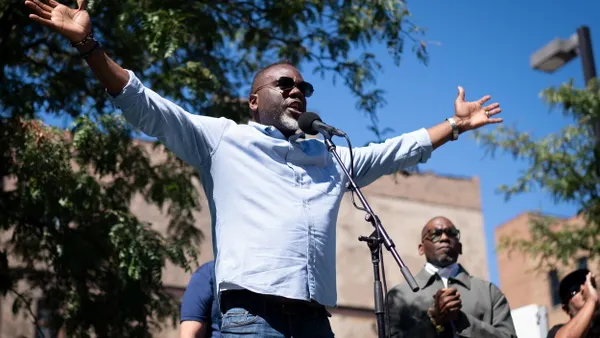Dive Brief:
- Cities must work hard to build trust with residents and manage their expectations when undertaking any projects, current and former government officials said at an event yesterday in Washington, DC.
- At a panel discussion at The Aspen Institute on ensuring equity in rapidly growing and developing cities, DC Deputy Mayor for Planning and Economic Development Brian Kenner said city leaders are "not going to make everyone happy," but they must be transparent and cooperative.
- Kenner and his fellow panelists recognized community opposition is to be expected, and that the onus is on government to make sure residents' interactions with it are as painless as possible.
Dive Insight:
Community opposition can be expressed in surprising ways, Kenner said. As the city floats adding more affordable housing units in traditionally poorer neighborhoods, sometimes residents say they want more market-rate housing or amenities like grocery stores, especially with neighborhoods in the city’s Southeast being regarded by some as a "food desert," he said. In that case, Kenner said residents are "simultaneously wanting and fearing things at the same time," meaning they want to improve their neighborhoods but are worried about being gentrified out of their homes.
That trust deficit is the legacy of years of so-called "urban renewal," when some city neighborhoods deemed to be decaying were torn down and redeveloped, often with negative impacts on the residents already living there. "Particularly when we’re working in communities of need, there is an enormous and justifiable trust deficit," Scott Kratz, director of the city nonprofit 11th Street Bridge Park, said.
Gentrification has made many cities more attractive places to live, but that has sparked fears among long-time residents that they will be forced out of their homes by higher rents and costs of living. Courtney Snowden, DC’s Deputy Mayor for Greater Economic Opportunity, said it is imperative to have people “gentrify in place” and benefit from improvements that go on around them. This can be done by ensuring housing is kept affordable and there are greater job opportunities. “We’ve been able to turn corridors around with partnerships across government,” she said, noting the importance of working together to ensure developments benefit everyone.
Fellow panelist Stephen Goldsmith, a former Mayor of Indianapolis and now a professor at Harvard University’s Kennedy School of Government, said technology means residents in traditionally poorer neighborhoods are less accepting of issues such as pollution, crime and troubled schools. Instead, he said, the use of data collection and even tools like sensors to measure emissions puts a greater onus on city government to fix them. “A lot of the conditions that we accepted as being part of poorer neighborhoods no longer have to be accepted,” he said.












